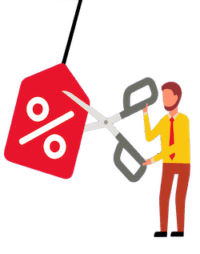Tip 5: Mortgage Reduction Secrets
Mortgage Rates in the NL: You Can Probably Get a Discount!
Dive into our exclusive guide for slashing your mortgage rates in the Netherlands. Find out how smart LTV ratio tweaks could translate into massive savings on your home loan—don’t miss out on these insider tips!

POTENTIAL SAVINGS
Potentially save hundreds annually
EFFORT
Usually just a phone call
LINKS
For detailed information on your bank’s policy regarding the schuld-marktwaardeverhouding (LTV Ratio), check their official website.
Unlock savings on your Dutch mortgage with smart financial strategies.
Introduction
Are you aware that you can reduce the interest rate of your existing mortgage in the Netherlands? It’s a fact often overlooked, yet with your mortgage steadily decreasing or your house appreciating in value, indicated by a higher WOZ-waarde, you may be entitled to a discounted rate. However, don’t expect your bank to inform you proactively. In most cases, securing this discount is as simple as getting in touch with your bank or utilizing their app. This guide will explain how you can take advantage of changes in your Loan-to-Value ratio to potentially lower your mortgage payments.
What Does Loan to Value (LTV) Ratio Mean for Your Mortgage?
Contrary to what many homeowners might think, having a fixed mortgage interest rate for a set period—whether it’s 5, 10, 20, or even 30 years—doesn’t necessarily mean you’re locked out of getting a reduced rate during that time. There are various discounts you could be eligible for, such as for bundling banking services, possessing an energy-efficient home, and importantly, through improvements in your Loan to Value (LTV) ratio. This article zeroes in on the latter.
The LTV ratio is a key term in mortgage banking, representing the relationship between the outstanding balance of your mortgage and the current market value of your property. It’s a measure of risk for the lender: a 100% LTV ratio suggests that the mortgage amount is equal to the full value of the house, posing a higher risk to the bank. If you default on your loan, the bank might face challenges recouping their investment upon selling the property. However, as you gradually pay off your mortgage, or if your home’s value increases, your LTV ratio improves, decreasing the bank’s risk. It’s at these moments that banks are often willing to grant a reduction in your mortgage rate.
Understanding and Calculating Your LTV Ratio
Continuing from the importance of your Loan to Value (LTV) ratio, let’s delve into how it directly influences the possibility of reducing your mortgage interest rate. The LTV ratio is the balance between two key figures: the amount you owe on your mortgage and the current value of your house. Calculating your LTV ratio is straightforward: divide your mortgage debt (hypotheekschuld) by your property’s market value (marktwaarde), then multiply by 100 to get a percentage. Here’s the formula:
Loan to Value (LTV) Ratio = (Mortgage Debt / Property Market Value) × 100%
Each 5% improvement in this ratio could translate to a discount on your mortgage rate, especially when your LTV ratio dips below the next threshold, up to the 60% mark. These reductions can result in savings that range from tens to even hundreds of euros annually, depending on your mortgage amount and how much your LTV ratio changes.
Dive into your mortgage details and discover how a few smart choices could improve your LTV ratio—and your interest rates.
Factors Lowering Your LTV Ratio
Now that we’ve established what the Loan to Value (LTV) ratio is and its influence on potentially securing a mortgage rate discount, it’s time to delve into its components. Let’s examine how making additional payments, keeping up with regular repayments, and the appreciated value of your property can affect your LTV ratio and, consequently, your mortgage rate.
Regular Payments
Your LTV ratio naturally decreases with your regular monthly mortgage payments. Therefore, it’s a good practice to recalculate your LTV ratio periodically to see if you’ve reached a new threshold that qualifies you for a rate reduction. Remember, most banks will not automatically lower your rate; it’s up to you to contact them to request it.
Extra Payments
Going beyond the minimum required payments on your mortgage can have a more significant impact than you might realize. In the Netherlands, making additional repayments up to 10% of the original loan amount annually is a right for homeowners, and it’s penalty-free. This can be a strategic move to substantially reduce your LTV ratio, leading to possible interest rate discounts.
Property Value Increases
The value of your property can also influence your LTV ratio. If you’ve made significant home improvements, a new valuation or taxatie may be needed to reflect these changes. Online valuations, which can be cost-effective, might be accepted by your bank – but always check their requirements first.
On the other hand, general market appreciation can also lead to an increased property value. This is often reflected in your yearly WOZ-waarde, which can serve as an official indicator of your property’s value increase. When this value goes up, you may be eligible for a lower LTV ratio and, as a result, a reduced mortgage rate. Uploading the new WOZ-waarde to your bank’s system can be a simple yet effective way to secure a discount on your mortgage rate.
Navigate your bank’s LTV policies to effectively lower your mortgage rate.
How to get a Mortgage Rate Discount from Your Bank
Navigating the complexities of mortgage finance can reveal opportunities for cost-saving—chief among them is securing a lower interest rate from your bank. This guide details the proactive measures you can take to potentially reduce your mortgage rate by understanding and leveraging the Loan to Value (LTV) ratio.
Now, let’s break down the steps you can take to ensure you’re not missing out on a mortgage rate discount that could be rightfully yours.
Regularly Assess Your LTV Ratio
Regular assessments of your Loan to Value (LTV) ratio are crucial. Calculate it using the formula: LTV Ratio = (Mortgage Debt / Property Market Value) × 100%. Knowing your LTV ratio helps you understand if you’re eligible for a rate reduction based on lender-specific thresholds. Additionally, it’s important to check your bank’s exact policy regarding LTV ratio steps for discounts. Banks may have different LTV thresholds at which rate reductions are applied, and understanding these can help you accurately gauge when to approach your bank for a rate reduction.
Updating Your Property Valuation
Typically, banks use the most recent property valuation you provided, often the one from your home purchase, to calculate your LTV ratio. This value generally stands until you update it with a new property valuation or the annual WOZ-waarde. Actively managing which valuation your bank uses — either the historical valuation or a newer, possibly higher one — can affect your LTV ratio and potential eligibility for rate reductions.
Engage with Your Bank
It’s important to understand that most banks won’t automatically apply a mortgage rate discount. Once you have recalculated your LTV ratio and believe you qualify for a reduction, directly engage with your bank to discuss your options. This step is essential to transform your improved LTV ratio into tangible savings. In some cases, you might be able to request this adjustment directly via your bank’s app. However, more often, you will need to make a phone call to your bank. Fortunately, this process is generally straightforward and quick, often taking only a few minutes to arrange. The effort involved is minimal compared to the potential savings you could achieve on your mortgage payments.
Here is a comparative overview of how some major banks manage interest rate discounts related to the LTV ratio.
| Lender/Bank | Lower interest due to repayment | Action required | Lower interest due to market value increase | Action required |
|---|---|---|---|---|
| ABN AMRO | Upon request | WOZ decision and appraisal report | Upon request | WOZ decision and appraisal report |
| Florius | Upon request | WOZ decision and appraisal report | Upon request | WOZ decision and appraisal report |
| Rabobank | Automatic | – | Upon request | WOZ decision or appraisal report |
| ING | Upon request | – | Upon request | WOZ decision or appraisal report |
| BLG Wonen | Upon request | WOZ decision or appraisal report | Upon request | WOZ decision or appraisal report |
| SNS Bank | Upon request | WOZ decision or appraisal report | Upon request | WOZ decision or appraisal report |
| Regiobank | Upon request | WOZ decision or appraisal report | Upon request | WOZ decision or appraisal report |
| ASN Bank | Upon request | WOZ decision or appraisal report | Upon request | WOZ decision or appraisal report |
| Munt Hypotheken | Automatic | – | Upon request | Appraisal report |
| NN | Automatic | – | Upon request | WOZ decision or appraisal report |
| Venn | Automatic | – | Upon request | WOZ decision or appraisal report |
Carefully weigh your options before pursuing a mortgage rate discount, as not all reductions may benefit your financial portfolio.
When Not to Seek a Mortgage Rate Discount
It’s essential to recognize situations where requesting a mortgage rate discount might not be in your best interest. Understanding the implications of different mortgage types is crucial for making informed financial decisions.
Variable Interest Rate Mortgages
With a variable interest rate mortgage, your interest rate fluctuates based on market conditions and not directly on your LTV ratio. Therefore, changes in your debt-to-market value ratio might not affect your interest rate in these cases. If you’re unsure about the impact on your variable rate, reaching out to your bank for specific guidance is advisable.
Savings Mortgages: Bankspaarhypotheek or Spaarhypotheek
For holders of ‘Bankspaarhypotheek’ or ‘Spaarhypotheek,’ lowering your interest rate can sometimes be counterproductive. In these savings-based mortgages, a reduced rate might necessitate increased contributions to meet your end-goal savings, as the interest earned on your savings would decrease alongside the mortgage rate. Careful consultation with a financial advisor is recommended to assess if a rate reduction aligns with your financial goals.
Multiple Loan Parts
If your mortgage comprises multiple loan segments, a change in your LTV ratio generally affects the entire loan structure. While this can be beneficial in uniformly lowering rates, it’s important to understand how it fits into your broader financial strategy.
Seek Professional Advice
Mortgage finance is complex, and a decision beneficial in one situation might not be suitable in another. When in doubt about rate reductions or other mortgage-related choices, consulting with a financial advisor or your bank is crucial. They can offer personalized advice, helping you navigate your mortgage management effectively.
Tips & Tricks
Receive Updates and Special Deals via Email
Subscribe to our newsletter for regular updates on fresh tips to save in The Netherlands and access to special deals just for our subscribers.
Your trust is important to us. We promise no spam, we won’t share your email with third parties, and you can unsubscribe at any time with just a click. Your privacy and peace of mind are our top priorities.




